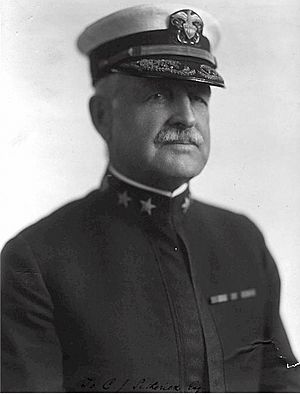Caspar F. Goodrich facts for kids
Quick facts for kids
Caspar Frederick Goodrich
|
|
|---|---|

Rear Admiral Caspar F. Goodrich, USN portrait photograph by Harris & Ewing, Washington, D.C., taken c. 1904-1909
|
|
| Born | 7 January 1847 Philadelphia, Pennsylvania |
| Died | 26 January 1925 (aged 78) Princeton, New Jersey |
| Allegiance | United States of America |
| Service/ |
United States Navy |
| Years of service | 1864–1919 |
| Rank | Rear Admiral |
| Battles/wars | Spanish–American War |
| Signature | |
Caspar Frederick Goodrich was an important admiral in the United States Navy. He served in two big wars: the Spanish–American War and World War I. He was born in Philadelphia, Pennsylvania, in 1847 and passed away in 1925.
Contents
Caspar Frederick Goodrich was born in Philadelphia, Pennsylvania. He joined the United States Naval Academy and graduated in 1864. After finishing his studies, he spent several years serving on different ships. These included the USS Colorado and USS Frolic. He also spent time on the USS Portsmouth and USS Lancaster.
Goodrich also worked at the Naval Torpedo Station in Newport, Rhode Island. This station was a place where new torpedo technology was developed. Later, he became the officer in charge of this station in 1886.
Leading Ships and Colleges
From 1891 to 1896, Goodrich was the commander of several ships. These included the USS Jamestown, USS Constellation, and USS Concord. After his time at sea, he became the President of the Naval War College in Newport for a year. This college is where naval officers learn about strategy and leadership.
In 1898, he helped create the Coast Signal Service. This service was important for sending signals and messages along the coast.
Service in the Spanish-American War
During the Spanish–American War in 1898, Caspar Goodrich commanded two ships: the USS St. Louis and the USS Newark. He played a key role in the war. On August 12, after his ships bombarded the city of Manzanillo, Cuba, he received its surrender. This was an important moment in the war.
After the War
After the Spanish-American War, Goodrich continued to command more ships. These included the USS Iowa, USS Richmond, and USS Minneapolis. He also served on land as the leader of important naval shipyards. He was in charge of the Philadelphia Naval Shipyard in 1900. Later, he led the Portsmouth Naval Shipyard in 1903.
In 1904, he was promoted to the rank of Rear Admiral. For the next three years, he was the Commander-in-Chief of the Pacific Squadron. This meant he was in charge of many naval ships in the Pacific Ocean.
Helping San Francisco
In 1906, a terrible earthquake hit San Francisco. It caused huge fires across the city. Admiral Goodrich quickly brought his fleet to San Francisco. His ships helped by spraying water from the port onto the flames. This helped to put out the fires and save parts of the city.
After this, he served as the leader of the New York Navy Yard from 1907 to 1909. He then retired from active duty on January 7, 1909.
Later Life and World War I
Even after retiring, Admiral Goodrich was called back to duty during World War I. He served as the officer-in-charge of a school for naval pay officers in Princeton. He finally retired for good on November 8, 1919. This marked the end of his 50-year career in the Navy.
In 1873, he married Eleanor Milnor. They had a large house called "Gladwyn" in Pomfret, Connecticut. Caspar Frederick Goodrich passed away in Princeton in 1925.
A Ship Named in His Honor
In 1945, a destroyer ship was named after him. The ship was called the USS Goodrich (DD-831). It was named to honor both Admiral Goodrich and his son, Lieutenant Caspar Goodrich.
Published Works
Admiral Goodrich also wrote several books and reports during his lifetime. These works often shared his knowledge about naval operations and history.
- Torpedoes—Their Disposition and Radius of Destructive Effect (1882)
- Report of the British Naval and Military Operations in Egypt, 1882 (1883, 1885)
- In Memoriam, Stephen Bleecker Luce: Rear Admiral, United States Navy, Born 1827, Died 1917, a Tribute (1919)
- Rope Yarns from the Old Navy (1931)
 | Victor J. Glover |
 | Yvonne Cagle |
 | Jeanette Epps |
 | Bernard A. Harris Jr. |

